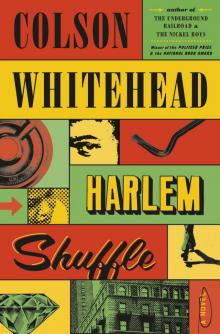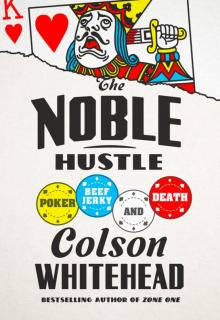- Home
- Colson Whitehead
The Intuitionist
The Intuitionist Read online
Acclaim for Colson Whitehead’s The Intuitionist
Winner of the Quality Paperback
Book Club New Voices Award
Esquire’s Best First Novel of the Year
A USA Today Best First Novel of the Year
A GQ Best Book of the Millennium
A Village Voice Literary Supplement
Favorite Book of the Year
“Literary reputations may not always rise and fall as predictably as elevators, but if there’s any justice in the world of fiction, Colson Whitehead’s should be heading toward the upper floors.”
—The New York Times Book Review
“The most engaging literary sleuthing you’ll read this year.… What makes the novel so extraordinary is the ways in which Whitehead plays with notions of race.”
—Newsweek
“Whether the subject is love or alienation, the invention of rich, new literary metaphors is difficult enough. When the subject is race in America, however, it’s almost impossible. In his first novel, The Intuitionist, Colson Whitehead has solved the problem, coming up with the freshest racial allegory since Ralph Ellison’s Invisible Man and Toni Morrison’s The Bluest Eye.…”
—Walter Kirn, Time
“A quirky and multilayered debut novel.… The Intuitionist reads like a pure feat of imagination, elevated by … stylistic sorcery and a gnawing sense of the narrative’s urban dislocation.”
—The Village Voice Literary Supplement
“Unusual.… Whitehead’s prose is graceful and often lyrical, and his elevator underworld is a complex, lovingly realized creation.”
—The New Yorker
“Brilliant, funny, poetic.… Equally intricate and rich—a supple, jazzy instrument that can swing from deadpan satirical fantasy to a straight-ahead portrayal of the pain and stoicism of black people living in a ham-fisted white world, looking for the ultimate elevator that will take them up and out.”
—The Utne Reader
“Highly imaginative and stylish.”
—Vanity Fair
“One of the unlikeliest books in recent memory … like any screaming across the sky, The Intuitionist comes out of the blue.”
—GQ
“A bizarre and funny mystery.”
—Vibe
“Colson Whitehead masterfully evokes a grey mid-century city that could have been torn from a Ben Katchor comic strip.”
—Los Angeles Times
“Dark, smart, [and] funny.”
—Details
“A beguiling, utterly original first novel.… Nuggets of social commentary are interwoven with scenic set pieces, beautiful flashbacks to Lila Mae’s childhood and episodes of good old-fashioned knuckle-breaking … a sheer delight to read and rich enough for college lit classes.”
—The Atlanta Journal-Constitution
“Gritty, brainy.… Whitehead doesn’t just travel back and forth between irony and sincerity, between the naturalistic novel of race and the imaginative novel of ideas—he simply occupies all territories at the same time. The boundaries separating those categories, which usually seem insuperable, fall away.”
—Salon
“The Intuitionist is the story of a love affair with the steel and stone, machinery and architecture of the city. It’s not a pretty love, but a working-class passion for the stench of humanity that its heroine, Lila Mae Watson, has made her own. But as always with love there is betrayal. This extraordinary novel is first voice in a powerful chorus to come.”
—Walter Mosley
“The Intuitionist is a facinating novel, full of quirky insights and beautifully imagined characters.”
—Gary Indiana
“An enormously accomplished first novel, a meditation on race and technology and imagination that is absolutely dazzling.”
—Susan Isaacs in Brave Dames and Wimpettes
“Colson Whitehead’s debut novel is part urban thriller, part meditation on race—and all vigorous language and supple imagination.”
—The Oregonian
“This splendid novel reads as though a stray line in Pynchon or Millhauser had been meticulously unfolded to reveal an entire world, one of spooky, stylish alternate-Americana, as rich and haunted as our own. The care and confidence of the prose, the visionary metaphor beating like a heart at the center—these do not outweigh the poignance and humor, the human presence here. The Intuitionist rises someplace new, and very special.”
—Jonathan Lethem
“The world of The Intuitionist is an unforgettable universe.”
—The Seattle Post-Intelligencer
“Brilliant.… Whitehead carves out an exclusive space for himself in America’s literary canon … his imagination and writing skills always keep the story fresh and will undoubtedly keep you guessing.”
—The Washington Post Book World
COLSON WHITEHEAD
The Intuitionist
Colson Whitehead was born in New York City in 1969 and graduated from Harvard College in 1991. His journalism has appeared in numerous publications. He lives in Brooklyn, New York.
FIRST ANCHOR BOOKS EDITION, JANUARY 2000
Copyright © 1999 by Colson Whitehead
All rights reserved under International and Pan-American Copyright Conventions. Published in the United States by Anchor Books, a division of Random House, Inc., New York, and simultaneously in Canada by Random House of Canada Limited, Toronto. Originally published in hardcover in the United States by Anchor Books in 1999.
Anchor Books and colophon are registered trademarks of Random House, Inc.
The Library of Congress has cataloged the Anchor hardcover edition as follows:
Whitehead, Colson, 1969–
The intuitionist : a novel / Colson Whitehead.
p. cm.
I. Title.
PS3573.H4768I58 1999
813′.54—dc21 98–6756
eISBN: 978-0-307-81996-3
www.anchorbooks.com
v3.1
for my parents
Contents
Cover
About the Author
Title Page
Copyright
Dedication
Acknowledgments
Down
Part One
Part Two
Up
Part One
Part Two
Acknowledgments
A boy should never leave home without a copy of American Standard Practice for the Inspection of Elevators, not unless he wants to get into trouble. Shout outs: Gary Dauphin, Wesley Jones, Valerie Burgher, Dan Schrecker, Darren Aronofsky, Sue Johnson, Ari Handel, Hugh Garvey, Jed Weintrob, Bill Parsons, Jim Macintosh, Jeannette Draper. Thanks to Kevin Young for encouragement and the title. Nicole Aragi, my agent, is awesome. Tina Pohlman, my editor, is a woman of wealth and taste. I couldn’t have done this without the love and support of my family and Natasha Stovall, the best partner a boy could have.
Part ONE
It’s a new elevator, freshly pressed to the rails, and it’s not built to fall this fast.
* * *
She doesn’t know what to do with her eyes. The front door of the building is too scarred and gouged to look at, and the street behind her is improbably empty, as if the city had been evacuated and she’s the only one who didn’t hear about it. There is always the game at moments like this to distract her. She opens her leather field binder and props it on her chest. The game gets harder the farther back she goes. Most of the inspectors from the last decade or so are still with the Guild and are easy to identify: LMT, MG, BP, JW. So far she doesn’t particularly like the men who have preceded her at 125 Walker. Martin Gruber chews with his mouth open and likes to juggle his glass eye. Big Billy Porter is one of the Old D
ogs, and proud of it. On many occasions Lila Mae has returned to the Pit from an errand only to hear Big Billy Porter regaling the boys about the glory days of the Guild, before. While his comments are never specific, it is clear to everyone just what and who Big Billy is referring to in his croaking, muddy voice. Rebellious among the bureaucratic rows of the Pit, Big Billy’s oak desk juts out into the aisle so he can seat his bulk directly beneath one of the ceiling fans. He says he overheats easily and on the hottest days of the summer his remaining hair slides away from how he’s combed it, the strands easing into nautilus whorls. It’s a slow process and watching it is like waiting for a new hour. But it happens eventually.
All the inspectors who have visited 125 Walker in the past have been Empiricists. As far as she can tell. When she gets fifteen years back in the record there are no more faces to put to the initials. She recognizes the initials from the inspection records of other elevators in other buildings but has never met the people they belong to. JM, for example, is also listed in the inspection record of the elevator Lila Mae departed just half an hour ago, and EH, she’s learned over time, has a thing for worn guide shoes, something no one ever looks at except the real stickler types. Checking guide shoes is a losing proposition. Some of the initial men must be in the pictures along the walls of the Pit. The men in those pictures sport the regulation haircuts the Guild required back then, respectable haircuts fit for men of duty and responsibility. The haircuts are utilitarian mishaps that project honor, fidelity, brotherhood unto death. The barber shop two doors down from the Guild, the one that always has big band music coming from inside, used to specialize. Or so they say. Some of the younger inspectors have started wearing the haircut again. It’s called a Safety. Lila Mae’s hair parts in the middle and cups her round face like a thousand hungry fingers.
The light at this hour, on this street, is the secondhand gray of ghetto twilight, a dull mercury color. She rings the superintendent again and hears a tinny bleating sound. Down twenty years in the record she finds one of the treasures that make the game real: James Fulton and Frank Chancre inspected 125 Walker within six months of each other. From Lila Mae’s vantage, it is easy to read into this coincidence the passing of the crown. Not clear why Fulton left his office to hit the field again, though. Twenty years ago he would have been Dean of the Institute and long past making the rounds of the buildings, ringing superintendents, waiting on worn and ugly stoops. Then she remembers Fulton liked to go into the field every now and again so he wouldn’t forget. Fulton with his mahogany cane, rapping impatiently on one of the three windows set in the front door of 125 Walker. Perhaps they weren’t cracked then. Perhaps he cracked them. Across from his initials the inspection record notes a problem with the limit switch, a 387. She recognizes the handwriting from Fulton’s room at the Institute, from the tall wooden display cases where his most famous papers are kept behind glass, in controlled atmospheres.
As for Chancre, he would have been a young and rising inspector back then. A little thinner, fewer exploded capillaries in his nose. He wouldn’t have been able to afford his double-breasted navy suits on a rookie’s salary, but his position has changed since those days. Lila Mae sees Chancre swallowing the super’s hands with his oversized mitts in faltering camaraderie. It takes a long time to become a politician, but he was born with the smile. You can’t fake smiles like that. Nice building you got here, chum. Nice to see a man who takes pride in his craft. Sometimes you walk into these places, you never know what you’re going to see, bless my heart. You want to say to yourself, how can people live like this, but then we are all dealt differently and you have to play what you’re dealt. Back home, we … He gave 125 Walker a clean bill. Lots on his mind, lots on his mind.
The wind is trapped in one of Walker Street’s secret nooks, pushing through, whistling. The elevator is an Arbo Smooth-Glide, popular with residential building contractors when 125 went up. Lila Mae remembers from an Institute class on elevator marketing that Arbo spent millions promoting the Smooth-Glide in the trades and at conventions. They were the first to understand the dark powers of the bikini. On a revolving platform festooned with red, white and blue streamers, slender fingers fan the air, summoning the contractors hither. The models have perfect American navels and the air is stuffy in the old convention hall. A placard overlooked for red-blooded distraction details in silver script Arbo’s patented QuarterPoint CounterWeight System. Has this ever happened to you? You’ve just put the finishing touches on your latest assignment and are proud as a peacock to show off for your client. As you ride to the top floor, the Brand X elevator stops and refuses to budge. You won’t be working with them anymore! Say goodbye to sticky, stubborn counterweights with the new Smooth-Glide Residential Elevator from Arbo. Over two million Arbo elevators are in use worldwide. Going up?
A bald head girdled by loose curls of red hair appears at the door’s window. The man squints at Lila Mae and opens the door, hiding his body behind the gray metal. He leaves it to her to speak.
“Lila Mae Watson,” she says. “I’ve come to inspect your elevator.”
The man’s lips arch up toward his nose and Lila Mae understands that he’s never seen an elevator inspector like her before. Lila Mae has pinpointed a spot as the locus of metropolitan disaffection. A zero-point. It is situated in the heart of the city, on a streetcorner that clots with busy, milling citizens during the day and empties completely at night except for prostitutes and lost encyclopedia salesmen. It’s a two-minute walk from the office. With that zero-point as reference, she can predict just how much suspicion, curiosity and anger she will rouse in her cases. 125 Walker is at the outer edges of the city, near the bank of the polluted river that keeps the skyscrapers at bay from the suburbs, and quite a distance from the streetcorner: He doesn’t like her. “Let me see your badge,” the man says, but Lila Mae’s hand is already fishing in her jacket pocket. She flips open her identification and holds it up to the man’s face. He doesn’t bother to look at it. He just asked for effect.
The hallway smells of burning animal fat and obscure gravies boiling to slag. Half the ceiling lights are cracked open or missing. “Back here,” he says. The superintendent seems to be melting as he leads Lila Mae across the grime-caulked black and white hexagonal tile. His bulbous head dissolves into shoulders, then spreads into a broad pool of torso and legs. “How come Jimmy didn’t come this time?” the super asks. “Jimmy’s good people.” Lila Mae doesn’t answer him. Dark oil streaks his forearms and clouds his green T-shirt. A door bangs open upstairs and a loud female voice yells something in the chafing tones reserved for disciplining children and pets.
The lumpy, pitted texture of the cab’s door tells her that management has painted it over a few times, but Lila Mae still recognizes the unusually wide dimensions of an Arbo Smooth-Glide door. Taking their cue from the early days of passenger-response criticism, Arbo equipped their newest model with an oversized door to foster the illusion of space, to distract the passenger from what every passenger feels acutely about elevators. That they ride in a box on a rope in a pit. That they are in the void. If the super doesn’t strip the old paint the next time he renovates, it will eventually impede the movement of the door. (Of course a lot of graffiti in this neighborhood.) Already the elevator door halts in its furrows when it opens. A violation waiting to be born, the nascent outlines of a 787. Lila Mae decides against saying anything to the super. It’s not her job. “You’ll want to start in the machine room, I guess,” the super says. He’s fixated on the ideal triangularity of Lila Mae’s tie knot, its grid of purple and blue squares. The tie disappears near her bosom, gliding beneath the buttons of her dark blue suit.
Lila Mae does not answer him. She leans against the dorsal wall of the elevator and listens. 125 Walker is only twelve floors high, and the vibration of the idling drive doesn’t diminish that much as it swims through the gritty loop of the diverting pulley, descends down the cables, navigates the suspension gear, and grasps the car. Li
la Mae can feel the idling in her back. She hears the door operator click above her in the dark well and then the door shuts, halting a small degree as the strata of paint chafes. Three Gemco helical springs are standard-issue buffers on Arbo elevators. They wait fifteen feet below her like stalagmites. “Press twelve,” Lila Mae orders the super. Even with her eyes closed she could have done it herself, but she’s trying to concentrate on the vibrations massaging her back. She can almost see them now. This elevator’s vibrations are resolving themselves in her mind as an aqua-blue cone. Her pen rests in her palm and her grip loosens. It might fall. She shuts out the sound of the super’s breathing, which is a low rumble lilting into a wheeze at the ultimate convexity of his exhalation. That’s noise. The elevator moves. The elevator moves upward in the well, toward the grunting in the machine room, and Lila Mae turns that into a picture, too. The ascension is a red spike circling around the blue cone, which doubles in size and wobbles as the elevator starts climbing. You don’t pick the shapes and their behavior. Everyone has their own set of genies. Depends on how your brain works. Lila Mae has always had a thing for geometric forms. As the elevator reaches the fifth floor landing, an orange octagon cartwheels into her mind’s frame. It hops up and down, incongruous with the annular aggression of the red spike. Cubes and parallelograms emerge around the eighth floor, but they’re satisfied with half-hearted little jigs and don’t disrupt the proceedings like the mischievous orange octagon. The octagon ricochets into the foreground, famished for attention. She knows what it is. The triad of helical buffers recedes farther from her, ten stories down at the dusty and dark floor of the well. No need to continue. Just before she opens her eyes she tries to think of what the super’s expression must be. She doesn’t come close, save for that peculiar arching of his lips, but that doesn’t count because she already saw that from when he opened the front door. The super’s eyes are two black lines that withdraw indistinguishably into the skein of his hieroglyphic squint. His lips push up so far that his nostrils seem to suck them in. “I’m going to have to cite you for a faulty overspeed governor,” Lila Mae says. The door opens slowly in its track and the drive’s idling vibration is full and strong, up here so close to the machine room.

 The Nickel Boys
The Nickel Boys Zone One
Zone One The Underground Railroad
The Underground Railroad The Colossus of New York
The Colossus of New York The Intuitionist
The Intuitionist Apex Hides the Hurt
Apex Hides the Hurt Harlem Shuffle
Harlem Shuffle The Noble Hustle
The Noble Hustle